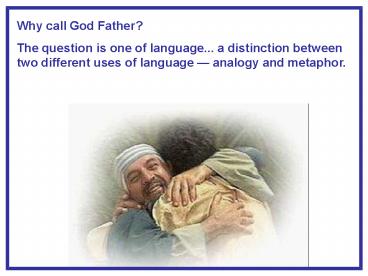Why call God Father? - PowerPoint PPT Presentation
1 / 13
Title:
Why call God Father?
Description:
Why call God Father? The question is one of language... a distinction between two different uses of language analogy and metaphor. Sometimes when we speak of God ... – PowerPoint PPT presentation
Number of Views:89
Avg rating:3.0/5.0
Title: Why call God Father?
1
Why call God Father? The question is one of
language... a distinction between two different
uses of language analogy and metaphor.
2
Sometimes when we speak of God, we attribute to
Him this characteristic or that, even if how He
is or does is different from our ordinary use of
that word. We call this way of talking about God
analogy. We use analogy when talking about God as
Father.
3
Other times when we speak of God, we liken Him to
something, mentioning the similarities between
God and what we compare him to God really
possesses the traits of the thing in question,
without suggesting that is all that God is. We
also use metaphor when defining God as father.
4
There is an intimacy in the word father that
transcends metaphor or analogy. There is a
quality about the father that attracts us, and it
reflects a relationship Jesus himself had with
God In perhaps his most God-dependant moment
Jesus used two words Abba, Father.
5
Luke 1511-32 Jesus story explaining the Heart
of the Father reminds us how intensely God
desires a personal relationship with all his
children.
6
Living a sinful life can be attractive and
pleasant, but in the end it leads to physical
destruction, spiritual despair, emotional
distress and social isolation. The process of
"coming to one's senses" is making a decision to
return to the safety of the father. It is the
decision that is important!
7
The father is waiting for his son to return home.
He has never stopped waiting.The son cannot find
true fulfilment away from home. The father knows
this and He waits.
8
The sons motivation is shallow. He has no
sincere sorrow. He is not upset by his own
offensive behaviour. It is not even that he
misses his father. He comes back to save himself.
Does the Father care? Does his insist on
proper contrition? Does he even pay attention to
the sons rehearsed speech?
9
The father is overjoyed that the son has begun
the journey home, for whatever reason. The
celebration begins! The meaning of the parable is
clear. At its centre is the fathers heart. It is
a story of acceptance and forgiveness love.
10
Returning home the son does not expect nor ask
for any gifts. The elder brother insists that
the lost son does not deserve any gifts. The
Father does argue with either son The Prodigal
deserves nothing. But the Father gives him
everything.
11
We all need to return to God He does not compel
us, so it must be a personal decision. The
fathers forgiveness is not gained words or acts.
He was always waiting There is nothing more to
add.
12
The parable depicts God's amazing availability to
forgive and restore us, his great love that
accepts us, ignoring our status and independent
of our past. It gives us courage to come to him
without fear, and inherit personal communion with
him his wish for us.
13
Abba- warmth, affection, confidence, faith. God
wants a relationship with each of his children,
for we are all lost Why not build on the
fact that He has never given up on you, never
demanded that you get it right He just wants you
back.































